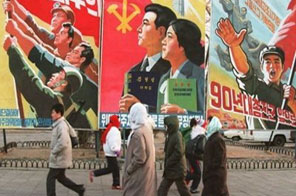North Korea sharply revalues currency
SEOUL: North Korea has sharply revalued its currency by issuing the first new banknotes for 17 years in an apparent attempt to curb inflation and clamp down on black-market trading, reports said Tuesday.
The hardline communist government implemented the change Monday morning, causing panic and confusion in the markets, Yonhap news agency and other South Korean media reported.
Yonhap, reporting from the northeastern Chinese city of Shenyang, said the exchange rate for the new currency is 100 to 1, with old-denomination 1,000-won notes being replaced by new 10-won notes.
"Many citizens in Pyongyang were taken aback and in confusion," it quoted a North Korean source engaged in trade with China as saying.
"Those who were worried about their hidden assets rushed to the black market to exchange them for (Chinese) yuan or US dollars. The yuan and the dollar jumped."
South Korea's Chosun Ilbo newspaper and the Daily NK, a Seoul-based Internet newspaper, carried similar reports.
Seoul's unification ministry, which handles cross-border relations, said it was checking the reports but noted there had been no official announcement in Pyongyang's media.
Cho Bong-Hyun, a specialist on the North's economy at Seoul's IBK Economic Research Institute, said the reported move was to tackle corruption and tame inflation.
"The sudden and bold manner the move was implemented indicates the government's intention to identify and send a warning to those who have amassed wealth illegally and unfairly," Cho told AFP.
Officially the North Korean won trades at 135 to the dollar. Cho said the current black market rate is between 2,000-3,000 but could soar to 20,000 if there is an acute dollar shortage.
The North issued new banknotes in 1949, 1959, 1979 and 1992 but the denominations remained unchanged except in 1959 when new notes were exchanged for old at a 100-to-1 rate.
Yonhap said the main aim appeared to be curbing inflation because the currency's value had slumped since economic reforms were introduced in 2002.
The reforms, to make wages and prices more realistic and introduce limited market freedoms, were largely rolled back in 2005. Authorities have lately been clamping down on free markets in an apparent attempt to reassert the regime's control.
Yonhap said the North may also have wanted to flush out funds from the underground economy, including money from citizens working abroad.
The country is mounting a national campaign to rebuild its crumbling economy by 2012, the 100th anniversary of the birth of its founder Kim Il-Sung.
Yang Moon-Soo, of Seoul's University of North Korean Studies, said authorities aim both to tame inflation and to trace citizens who have amassed wealth either legally or illegally.
Those who feared punishment would have to bury their illegally earned money, he told Yonhap. "There will be less cash circulating in the market and more government control of the people."
Daily NK, in a story datelined Shenyang, said Monday's move caused alarm in markets. "When the news spread in the jangmadang (markets), people panicked," it quoted a source in the northeastern province of North Hamkyung as saying.
A source in the western city of Sinuiju, on the border with China, told the paper: "Traders gathered around currency dealers. Chaos ensued when currency dealers tried to avoid them."
Chosun Ilbo said the revaluation was to curb inflation and tighten control over society before an eventual power transfer from leader Kim Jong-Il to his son Jong-Un.
"Prices have gone up too high since the economic reform measures taken on July 1, 2002," a source told Chosun. "The North Korean currency has been devalued too much, apparently causing the currency change."






